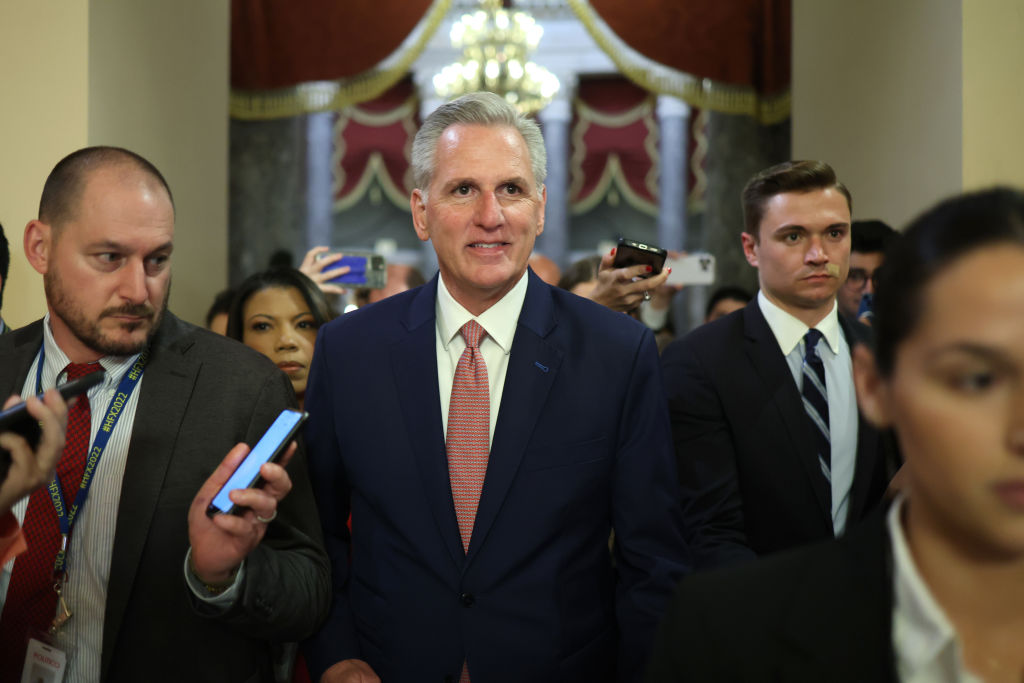Republicans entered the debt-ceiling fight with grand ambitions. Last fall, they considered demanding reforms to Social Security and other entitlements as the price for raising the federal government’s debt limit in early 2023. When President Joe Biden predictably demagogued any changes to the Social Security and Medicare systems that overwhelmingly drive long-term deficits, Republicans downshifted to ambitious discretionary savings. Now, it appears that Republicans may settle for a small fraction of those discretionary spending savings, while expanding Supplemental Nutrition Assistance Program (SNAP) and significantly scaling back other priorities.
To be sure, those earlier ambitions were wildly unrealistic. Republicans enjoy only a razor-thin House majority, while Democrats control the Senate and White House. And the debt limit was a hostage most Republican lawmakers knew they could not shoot. The political reality is that most aggressive spending cut proposals are deeply unpopular even with Republican voters, and using the debt limit as a bargaining further accelerated the White House opposition to spending cuts.
Yet the GOP benefited from Biden’s bad miscalculation that House Republicans would never be able to unify and pass a spending cut package, and that any effort would bring an intense voter backlash. House Republicans surprisingly passed the Limit, Save, Grow Act, which would have saved $4.8 trillion over 10 years: $3.2 trillion by cutting appropriations and capping annual growth at 1 percent for a decade, and the rest through expanding welfare work requirements, streamlining red tape, and repealing student loan forgiveness, clean energy subsidies and IRS funding. When it proved relatively popular, the president had no backup plan and was therefore forced to negotiate. Seeing Biden reluctantly come to the negotiating table only accelerated expectations among the GOP. Those soaring expectations explain the conservative disappointment at the release of the modest final deal.
A weak deal.
The Fiscal Responsibility Act (FRA), 314 to 117 could be described as a “choose your own adventure” bill. At first glance, it appears to have strong spending caps, welfare work requirements, and regulatory reforms that GOP lawmakers can sell to conservative voters. However, a closer inspection reveals several loopholes for Democrats to quell any significant fears from their own voter base.
The bill text includes statutory discretionary spending caps that would reduce nonemergency appropriations by 0.8 percent in 2024, and then cap spending growth at 1 percent annually through 2029. However, only the spending caps for 2024 and 2025 would be enforced by the normal automatic sequestrations of any enacted overage. The remaining four years of caps contain no enforcement mechanism whatsoever. Consequently, the Congressional Budget Office did not even score the 2026 through 2029 caps.
And even the 2024 and 2025 spending caps are less than meets the eye. On paper, defense spending would rise by $28 billion next year, and nondefense appropriations would fall by $40 billion, to produce the net reduction of $12 billion. However, the White House is claiming that both parties also pledged to later add $10 billion in nondefense spending in 2024 and again in 2025, purportedly “offset” by a $20 billion rescission of IRS funding that was scheduled to be spent almost a decade from now.
This is clearly a budget gimmick. The $10 billion in additional spending in 2024 and 2025 would surely be renewed for all subsequent years and become part of the permanent spending baseline. And Congress is virtually guaranteed to cancel the aggressive future cut in IRS funding that would otherwise cost the jobs of tens of thousands of IRS agents. In other words, both funding cliffs will likely be repealed, and spending will be permanently expanded.
It’s a similar story with pandemic funding. The bill’s $28 billion rescission of unspent COVID funds may also be used to “offset” $28 billion more in additional appropriations. Rescinding funds that are no longer needed is wise, but reprogramming them into new discretionary spending increases net spending in two ways. First, CBO estimates that only $11 billion of those COVID funds would have ever been spent, so translating them into $28 billion of new appropriations would yield a $17 billion net spending increase. Second, like the previous example, any $28 billion in new spending would surely be renewed every year thereafter, long after any offsetting savings have been applied.
In fact, the bill deposits $22 billion into a vaguely named slush fund within the Department of Commerce that would be reprogrammed into other spending later this year, outside the spending caps.
The Congressional Budget Office estimates that the spending caps would save $245 billion over the next two years, and the smaller baseline would in turn drop total projected 10-year discretionary outlays by $1.3 trillion (these are savings relative to a baseline of spending growing annually at the inflation rate. Nominal spending levels would still rise). Yet the aforementioned gimmicks may significantly reduce the savings in 2024 and 2025, which would in turn trim the promised savings in the later years as well. Furthermore, nothing requires Congress to maintain lower discretionary spending levels after 2025, when the enforcement of the spending caps expires.
One interesting provision triggers an automatic continuing resolution extending agency budgets at 1 percent below the prior year’s spending levels if Congress fails to finish this year’s appropriations bills by January 1, 2024, and next year’s appropriations bills by January 1, 2025. This policy could make it safer for fiscal conservatives to block the passage of appropriations bills with extraneous spending without being pressured to fear a government shutdown. At the same time, Republicans may be hesitant to allow across-the-board cuts that would include defense and veterans’ health care.
The rest of the Fiscal Responsibility Act includes some marginal reforms. Changes to SNAP work requirements would actually add 78,000 individuals to the rolls. The student loan repayment pause would finally end, but the Biden loan forgiveness policy (still tied up in the courts) would not be repealed. The law includes an 18-month trial of an “administrative PAYGO” proposal that would require the administration to offset the fiscal cost of major new regulations, but it lacks true enforcement. The required environmental impact statements that delay federal infrastructure projects for years and even decades would be modestly pared back.
And for all this, the debt limit would be suspended until January 1, 2025.
A must-pass bill.
While underwhelming, the Fiscal Responsibility Act deserves to be passed and signed into law. The federal government is likely just days away from hitting the debt limit, and Congress simply cannot risk the economic calamity that could result from Washington defaulting on substantial federal obligations and possibly even its own debt. Beyond that, a marginal improvement is still an improvement nonetheless.
Voting down this bill will not reopen negotiations for a better deal. Instead it would resemble the 1990 budget negotiations, when—after President George H.W. Bush and congressional Democrats carefully negotiated a budget deal that avoided income tax hikes—misguided congressional Republicans revolted against the deal anyway. This forced Bush to break his “Read My Lips” pledge against income tax hikes in order to secure more Democratic votes. The more congressional Republicans take their votes out of play, the more congressional Democrats will end up shaping the final legislation.
Because the FRA represents a marginal reduction in spending—and there is no path to a better deal for conservatives—blocking such legislation based on an unrealistic purity test would represent easy politics yet irresponsible legislating. If Republicans want deeper spending cuts, they first need to win more elections. A small House majority cannot dictate federal policy. Democrats succeed in growing government by continually pocketing small legislative expansions and then relentlessly coming back for more later. Republicans wanting to cut government can learn from that approach.








Please note that we at The Dispatch hold ourselves, our work, and our commenters to a higher standard than other places on the internet. We welcome comments that foster genuine debate or discussion—including comments critical of us or our work—but responses that include ad hominem attacks on fellow Dispatch members or are intended to stoke fear and anger may be moderated.